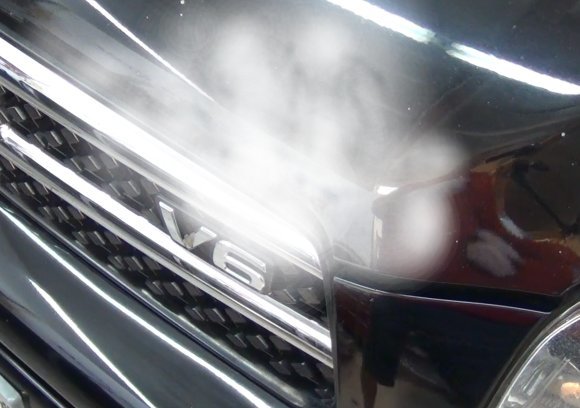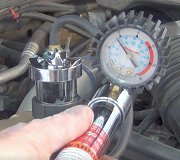I'm extremely mechanically inclined and enjoy doing my on vehicle maintenance (as long as I have the tools and knowledge to do so#. However I do know when it's time to let the experts do it.
I just recently replaced the 2nd radiator on this vehicle which has been on here for ONLY 3 years; the original had been on here up until then. This second one began leaking anti-freeze into the oil, and I #along with a 20 year mechanic friend) was pretty sure it was the internal seam on the oil cooling side of the radiator (that has been since verified by putting a new radiator in along with a complete FLUSHING of the oil system prior to a NEW Radiator installation) because it also was leaking externally around the seam (very small amount) as well.
Prior to this problem my oil pressure has been very unstable At start-up it races up to about 60 lbs and then slowly declines as the vehicle warms up, after the truck warms up it idles at about 15 to 20 lbs of pressure. However after it has been driven for a while on the hwy the oil pressure would be between 22 - 30 lbs; but at idle or stop (not moving) it will be about 8-10 lbs.
I recently was told that this oil pressure problem was probably attributed to the oil lines coming from the block near the oil filter were not completely secured (tight#, the same ones that go to the radiator. We could noticably see this leakage when the truck was on the service rack #also the small puddle in my drive#. The mechanic suggested replacing the lines or at a minimum tighten them ASAP. I haven't had the funds to do this yet #UNEMPLOYED#. Back to the NEW radiator.
Presently the oil is clear now after 100 miles of use with the NEW radiator #radiator number 3#, but now it has a leak at the seam on the transmission side. I purchased both these radiators from Radiator Depot. Has anyone else had any BAD experiences with inferior radiators from this company? They swapped me a NEW one when I asked to exchange radiator #2 after 3 years. I'm receipt hoarder, so I was able to do this with NO problem. They were extremely nice about it. BUT now I have another BAD #I'm pretty sure) radiator.
Sorry for this novel.
Can anyone verify for me that this is NOT attributed to bad or inconsistant HEAD pressure? This truck gets an oil change every 3,000. It gets a oil flush every year or at 15,000.
With 300,000 miles you can tell I baby it. I use Quaker State High mileage with Rislone. Half can of Seafoam every other oil change and half can of Seafoam in the gas every 3rd tank full. I presently don't have the funds to get a head pressure check, but I'm pretty confident with NO oil leaking in other places (heads, valve cover (only normal age) or intake) or signs of anti-freeze in the oil.
I appreciate any help and yor patience. This is my only vehicle until I'm back working, but even then I still want to keep it around to restore.
Thanks to all who read this and reply.
Rick
Tuesday, March 8th, 2011 AT 6:37 PM


